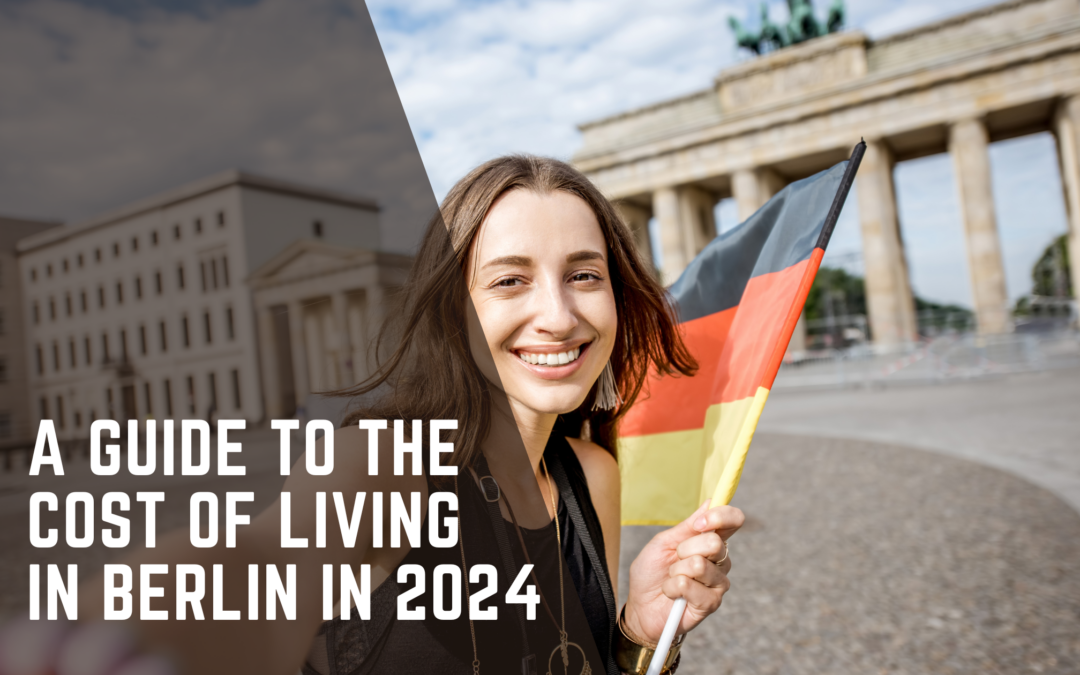A GUIDE TO THE COST OF LIVING IN BERLIN IN 2024
It seems that just about everyone wants to move to Berlin these days. People come for all sorts of reasons, like working at a startup, experiencing the epic party scene, or joining the thriving creative community. Berlin’s especially welcoming to newcomers from any background, with current demographics telling us that almost half a million non-Germans from approximately 180 countries live in the city.
The hype is real and the current population of 3.5 million people has grown by 0.31% annually since 2015. Berlin continues to remain popular and despite getting more expensive, remains one of Europe’s most affordable cities when compared to the likes of London or Paris.
Recommended reading: How Much Does It Cost To Move To Germany? Use Our Calculator!
Join Our Community
Stay ahead with the latest news on immigration developments, employment opportunities, and other updates about life in Germany. Get valuable insights, early access to Berlin Life guides, invites to community events, and more. Don’t miss out – subscribe to one of the most popular newsletters in Berlin.

THE COST OF LIVING IN BERLIN
This report is a personal account of my cost of living in Berlin. By no means, am I attempting to depict my situation as typical. I’m simply hoping this glimpse into my expenses will help you figure out how much it might cost for you to live in Berlin as well.
To put things into perspective before we get started:
⭐ I live on my own and have no children, but I do embrace clichés and call these two very cute cats, my roommates
⭐ All expenses listed are 100% assumed by me
⭐ I have a full-time job and receive additional income from this site, as well as my travel blog
Cost Of Living In Berlin: Fixed Monthly Expenses
1) Rent: €1050 per month (warm)
I moved to Mitte in January 2022 and now occupy a newly renovated, 75-square-meter apartment in a 18-story Plattenbau. In addition to the central location, the apartment comes with hardwood floors, two bedrooms, a fully equipped kitchen, a laundry room, and a bathroom with a bathtub. While the second bedroom currently functions as an office, gym, and guest room, there’s always an option to rent it out to a new roommate if the money gets tight.
Recommended reading: Our Berlin life hacks post for tips about where to buy furniture, hire handy people, and more.
I admit that my rent is uncommonly low considering my location, flat size, and amenities. I’m lucky to rent from a private landlord (Vermieter) versus a big corporation like Deutsche Wohnen.
2) Health Insurance: €362 per month
Healthcare’s a significant expense for all of us, but well worth it considering it covers so many things like sick days, doctor’s visits, surgeries, basic dental, etc. The amount you contribute to healthcare depends on your income level – expect to pay out 14.6% of your gross monthly income whether you’re employed full-time or a freelancer. For those employed full-time, your employer will cover half of the costs, leaving you to pay about 7.3%. Worth noting – if you make more than €58,050 per year, the cost of health insurance is capped and stops rising. For full-time employees, this works out to be about €362 per month and for freelancers, this works out to be €725 per month.
I have public insurance with TK and pay around €362 per month. As I’m employed in a permanent position, my employer covers the other half.
Why have I listed healthcare as a cost of living? Although many people don’t think twice about healthcare costs because it’s deducted from their monthly salary, we’ve explicitly included it here for people coming outside of the European Union. For example, if you’re Canadian like me, you won’t be used to seeing such a massive deduction from your monthly salary. I’m telling you in advance so you won’t be surprised when you get that first pay cheque. I also list it here so that freelancers are aware they have to pay out of pocket and assume the costs themselves.
3) Electricity: €38 per month
I’m a happy new customer with Ostrom and currently pay €38 per month. Electricity prices in Germany are also among the highest in the world. We suggest shopping around and seeing what deals you can get from providers on CHECK24.
Recommended reading: Our tips about how to save energy (and money!) in Germany.
Unfortunately, some electricity providers may decline your business if you’re new to the country and don’t have an established credit history. This happened to me when I first moved here, so if all else fails, go with Vattenfall and switch providers at a later date.
4) Internet: €55 per month
As I work from home full-time and use streaming services like Netflix and Amazon Prime A LOT, it’s important for me to have a fast and reliable Internet connection. I’ve been with PYUR for several years and am really happy with their services. The high-speed connection is fairly pricey at €55 a month but is totally worth the cost.
5) Mobile Phone Provider: €20 per month
I currently don’t have a contract with a mobile phone provider and have a sim card with Alditalk. For this, I pay €15 per month for 10 GB of data and another €5.00 for extra texts and calls.
6) Bank Account: €5 per month
I have a basic account with Sparkasse which costs me €5 per month.
7) Insurance: €80 per month
My insurance with Sparkasse includes home insurance, personal liability insurance, and life insurance. It’s €91 every three months or about €30 a month. I also have legal and dental insurance (to cover extra dental cleanings and other perks) with Feather. This costs me an additional €28 per month, so in total, I spend €58 a month on every kind of insurance known to man. Additionally, I have insurance for one of my cats, which runs me about €22 a month.
8) ARD: €17.50 per month
Even though I don’t have a television or radio, I still grin and bear it by paying the controversial “TV tax” which is not really a tax but a fee that everyone must pay to fund public broadcasting in Germany. I pay €52.50 every three months, which works out to be €17.50 a month.
9) Urban Sports Club: €9.99 per month
I’m currently taking advantage of a perk through work where I get access to Urban Sports Club’s Medium plan for the bargain price of €9.99.
10) Streaming Services: €30 per month
At the moment, I’m subscribed to Amazon Prime and Netflix for €30 a month. Every so often, I’ll sign up for another service to get access to programming like HBO’s House of the Dragon for a limited time and cancel when the season is over.
Cost Of Living In Berlin: Variable Monthly Expenses
1) Groceries: €400 per month
Another cost of living in Berlin is food, glorious food. Although I order takeout or dine at restaurants with friends, I’m cooking more at home since the pandemic started. As a result, my monthly groceries cost went up and I tend to spend about €400 per month.
I mainly shop at the Edeka and Netto next to my apartment building and I also place online orders for delivery with Rewe every so often. If I’m in a crunch, I order from Gorillas, Flink, or Getir – all of which deliver groceries within about 15 minutes. When I want to cook something really special, I sometimes go to more upscale chains like Biocompany or Frischeparadies.
2) Eating Out: €200 per month
If you’re happy to eat a simple a Döner, you’ll pay €6 at most spots around the city. If you want a basic meal out – pizza, pasta, a burger, ramen, or some form of Asian or Indian, most mains will be around €10. Dining at a more popular or upscale place will typically run you between €15 – 20 for a main. Berlin is filled with plenty of upscale eateries as well, with Restaurant Tim Raue being a prime example.
You can buy basic beers from any Späti (convenience store) or supermarket for €2 – 3. Buying a typical German beer in a bar or club will start at around €4 , with craft beers typically starting at €5. A bottle of wine at supermarkets will fetch you anywhere from €3 – € 12 while wine in upscale specialty shops will be more. In a bar, a glass of nicht so gut wine will start at €4, whereas a decent glass of wine will start around €6.
A coffee from a bakery usually starts around €2- €3 and fancier coffees at a trendy hotspot will fetch you around €5 and up. You can also buy a decent package of coffee in the supermarket for €6 – €7 or fork out around €20 for a high-end coffee from a specialty shop like The Barn. I’ve taken to ordering higher-quality coffees online at roastmarket.de.
A great thing about Berlin is that eating out is (mostly) still affordable and you can easily have a decent meal (including a glass of wine!) for €25 or so. Note, drinking alcohol, or even ordering water for that matter, will significantly add to your meal expenses.
As I love trying out new restaurants around the city, I spend about €200 a month on takeout or eating out. When I’m feeling lazy, I use Lieferando, Wolt, or UberEats.
Cost Of Living In Berlin: Other Monthly Expenses
To share a comprehensive picture of how much things cost in Berlin, I’m also sharing some other common expenses that people have, even though I’m not personally paying for these particular things at this time.
1) Fitness Studios
Most studios offer memberships for €20 – €30 a month if you sign-up for a long-term contract. In the past, I’ve held memberships at FitX and Lady Company and paid about €20 a month. If you want more flexibility and access to different types of classes and facilities, you can always signup for Urban Sports Club which has plans which range from €33 – €149 per month.
2) Cigarettes
I’m no longer a smoker and and now three years smoke free (yeah!). Unfortunately, Berlin’s a smoking city and there are smokers everywhere. A pack of 20 cigarettes will run you about €7. Most people opt to save money and buy tobacco, papers, and filters to roll the cigarettes themselves. Others stock up when visiting other countries like Poland where cigarettes are way cheaper.
Cost Of Living In Berlin: Summary
This is my cost of living in Berlin:
⭐ My fixed expenses come to about €1306 per month. I don’t count health insurance as it’s automatically deducted from my gross salary.
⭐ My variable expenses are an additional €700 per month, which I can adjust at any given time if I want to save more money. I still manage to put money into savings each month as well.
⭐ In total, my expenses come to €2,006 per month.
Our FREE Berlin Cost Of Living Calculator!
To help you figure out your monthly living expenses, use our free Berlin cost of living calculator. For added convenience, save your quote and have it emailed to you as a PDF.
Be sure to use the Email Quote feature to get a summary of the costs emailed to you.
We hope this guide to the cost of living in Berlin gives you an idea of how to calculate your living expenses for your move to Berlin.
RELATED CONTENT
How To Make Friends In Berlin In 2024
Find out the different ways you can make friends in Berlin with these tips about how to meet new people in the German capital.
Best Berlin Blogs To Help You Experience The City
Keen to explore the city’s history, find a brunch spot, or get tips on finding a flat? These are the best Berlin blogs to get you started.
Mail Forwarding In Germany – Send Post To Your New Address
Moving to a new flat or leaving Germany entirely? Don’t miss important documents & use Deutsche Post’s service for mail forwarding in Germany.

Cheryl Howard, Founder @ The Berlin Life
Hi, I’m Cheryl. My mission is to help you move to Berlin and find work.
A Canadian in Berlin for 10+ years, I have the unique experience of moving to Berlin – not once, but twice. During my time in Berlin, I’ve had five different visas and worked as both a freelancer and a permanent employee for numerous Berlin companies. I even managed to find a new job during the pandemic and again in 2023, during Germany’s recession and massive layoffs in tech.
My day job has involved work as a hiring manager, overseeing the recruitment of countless people, as well as a team coach helping teams and individuals work better and find happiness in their careers. Through my side projects, I’ve also shared my personal experiences by publishing a series of helpful blog posts, creating a thriving community of job seekers, and hosting events to help people find work in Berlin. In 2021, I decided to put my coaching and recruiting talents to use by creating The Berlin Life, bringing my existing content and community together in one spot.
The combination of my personal and professional experience means I know exactly what it takes to move to Berlin and find work.





Hi Cheryl,
Thanks for the great post and lots of good insights. Question, since the inflation has arrived in Germany too (and not sure if we need to be concerned about this in the months to come w/ same fixed income) but wanted to ask:
how much net income one single person should make in order to live without financial worries ? Like NOT pay check to pay check…
Well, I know this is a very broad question because it depends where you want to live and how much you spend on a monthly bases; however, i checked at numbeo.com and avg net income has kept increasing since i checked a couple a months ago and I am wondering mine is fallen short? One friend said, if you want to live comfortably in berlin 4k€ net (monthly) is perfect. So if you make 3k € is it good or should i ask for a raise?
Just to give you a hint— i am staying at a temp place (furnished, everything included (bills) in Mitte. and i’m looking for a place near by or in Prenzlauer berg (1bed or studio + furnished )— the rentals range from 1200-1400 or even higher) I was told it’s difficult to find apt for 1400€ even by a real estator.
What would your take be? (I am a senior level employee)
Hi Zooey! Thanks for your kind words and of course, for stopping by our website and reading this article. We’re always thrilled to hear when people find our content helpful. <3
What you friend suggested as the ideal monthly net amount to live comfortably, is frankly beyond the reach of most Berliners. I can't tell you how many people would just dream of reaching that income level in their lifetimes. As you mentioned, providing an exact figure to live comfortably is actually impossible because the situation differs so much for each person. Even the notion of "live comfortably" can have wildly different interpretations as to what that really means. For me, I could tell you that €3,000 netto monthly is actually a very comfortable amount for most single people to live on but for others, you may think it's too little.
Because of that, we purposely avoid answering this question and leave it to you. To make things easier, we added a calculator feature to help you figure out your approximate monthly budget and plan from there. Sometimes, something as simple as expanding your desired living area or choosing a different electricity provider can make a huge difference in costs.
I'd further suggest reading our article about how much if costs to move to Germany (https://theberlinlife.com/cost-to-move-to-germany/). We get really deep into the rental costs for new flats and how it all works. For people coming from abroad, these costs are often a big surprise!
As for asking for a raise? Most (good) German companies will automatically offer all employees annual salary adjustments to take into account inflation and other factors. I’d suggest talking with your manager or your People team to find out the company’s overall policy/plans and what they can do for you individually, if anything.
Hope this helps and best of luck finding a new home! 🙂
It all depends on the cost for the accomodation….unfortunately especially for new offers the prices starting to get ridiculous especially compared to the average salary. There is a big “predatory” competion on the housing market (not sure if is the right word) which basically destroys the Berlin spirit. Despite this more and more people want to move here – especially in the city center areas which basically increases the challenge.
Quite some investors use this situation and offer especially for experts temporary places. I know two friends who basically “move” since two years from place to place…
Berlin is a fantastic city but the housing situation really makes me think twice if I can advise it without a doubt….especially for single expats who want to live on their own.
Hi Dorian,
Everything you said is sadly soooooo true! It’s quite an unfortunate development. We had our rent cap in place and when it was knocked down, things actually worsened. Just check this recent article: https://www.iamexpat.de/housing/real-estate-news/berlin-among-europes-priciest-cities-renting-after-rent-cap-abolished.
You can survive on your own for sure! I have gotten by on my own all this time. And if worse comes to worse, you take a WG until you find something for yourself. It might take a while to find a fairly priced place – they do still exist actually. Deciding to go outside the city center also helps. 🙂